REPOST -- CTP Episode of the Day - 04.12.06 - One Son
Today's Cherished Episode: One Son (6x12)
Original Air Date: February 14, 1999
Written By: Chris Carter & Frank Spotnitz
Directed By: Rob Bowman
Cassandra Spender outlines the real connections between the Syndicate, the warring alien factions, a half century of sinister experiments, and the abductions of Scully and Samantha Mulder. Using her information, the agents reach the end of their long quest -- and confront a worldwide apocalypse.
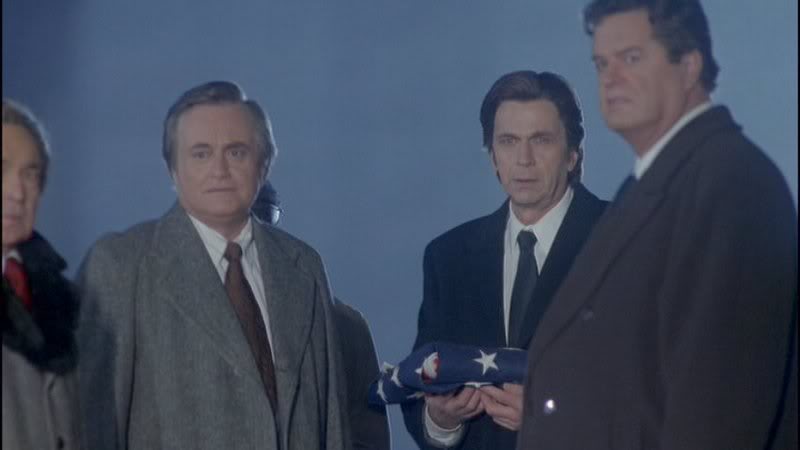
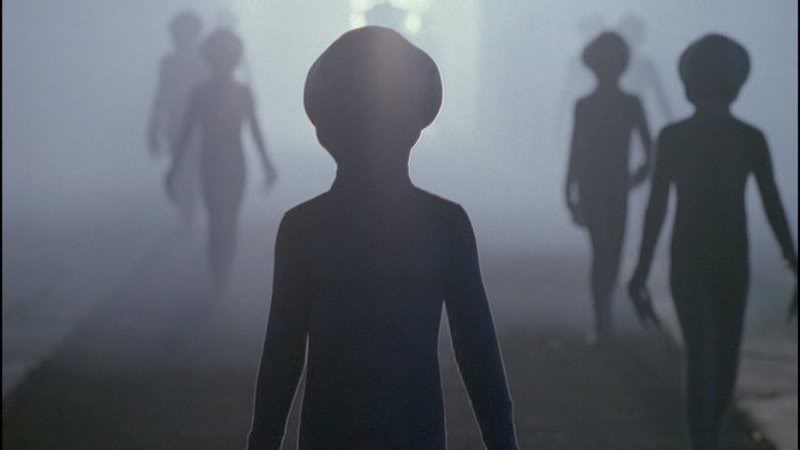
"Scully, you're making this personal."
"Because it is personal, Mulder. Because without the FBI, personal interest is all that I have, and if you take that away, then there is no reason for me to continue."
Some "One Son" Tidbits and Musings:
-- "Two Fathers" and "One Son" tried to be the most important, revelatory, and shockingly unexpected episodes in X-Files history. They revealed Cassandra Spender's relationship to Cigarette-Smoking Man and to the alien colonization project, and drew a final curtain -- at least as final a curtain as was ever drawn on The X-Files -- on the fatally conflicted FBI agent Jeffrey Spender. They brought an end to the shadowy Syndicate and the conspiracies that formed the basis of its existence, as well as much of the complex mythology that helped to drive the series since Season One. They also had an important relationship to The X-Files movie and the quibbles of some of the fans who rushed to see it in June 1998. But beyond all that, in the eyes of the fans, the most important thing that the two-parter accomplished was to bring an end to Mulder and Scully's estrangement from the X-Files Division and Walter Skinner.
-- "One Son" was not one of the most dramatically successful mythology episodes of the series, according to executive producer and episode co-writer Frank Spotnitz. "But it was one of the most important," he said. "And in a lot of ways, it is one of the most interesting episodes of the mythology because it closes a huge chapter in the series." Spotnitz recorded a new commentary on "One Son" for the special X-Files "Colonization" DVD set; and many of his observations shared here are from that commentary.
-- "We very consciously came to the decision to close this chapter because there was a narrative drag," Spotnitz said. "There were so many questions we had to drag forward over the years that it became untenable, so we were looking for a way to close this chapter and open a new one and that is indeed what this two-parter did."
-- The date and time stamp on the teaser was 10/13/1973, 10:56 p.m. (CC's birthday 10/13 month and day and 10/56 month and year).
-- To get the 1973 photo of the Cigarette-Smoking Man and Bill Mulder to burn just right -- slowly and from the edges inward -- producer Paul Rabwin and his "insert" camera crew went through fifteen takes, fifteen color photographs, and uncounted applications of kerosene and/or fire retardant.
-- Spotnitz felt that the scene of the American flag being laid down before the aliens "was a striking image because that was what this episode was about: the sacrifice of honor, sacrificing personal honor for self-interest. Most interesting in this episode were the dramatic dilemmas faced by Cassandra and Jeffrey Spender, by Cigarette-Smoking Man, and by Mulder."
-- The scenes at El Rico were filmed inside a real gargantuan hanger: the largest freestanding wooden-framed structure in the world. Located at a decommissioned Marine Corps helicopter base in Tustin, south of Los Angeles, the hanger was more than a thousand feet long and 240 feet from floor to ceiling. It was built in the 1920s to shelter nine or more tethered U.S. Navy blimps. It nearly swallowed up whole the 75 plus members of the X-Files crew, who managed to fill only a small corner. The hanger was perhaps familiar to X-Philes: It was the venue for the Los Angeles X-Files Expo, held in March 1998.
-- "Production costs of the series escalated enormously when the series moved to Los Angeles," said Spotnitz. "And by Season Six the mythology episodes had become a tradition -- to have astonishing production values in them. But it became increasingly unaffordable to do so. So finding an amazing location like the hanger was a way to try and create that cinematic scale and still keep it affordable."
-- A dozen or so young girls, dressed in form-fitting costumes and alien masks, played the small gray aliens in the 1973 flashbacks. "They were great," recalled director Rob Bowman, smiling. "It was freezing cold outside, where they all had to start. The hangar doors didn't open very quickly, so they waited in their coats and sweaters with their mommies and daddies. When we yelled 'action' they peeled off all their outer layers, handed them to their parents, and ran inside."
-- At the end of the episode, unchaperoned adult actors, playing the faceless alien rebels in 1999, retraced the young girls' steps. They were made faceless by special effects makeup supervisor John Vulich after consultations with Vancouver-based makeup wizard Toby Lindala, who created the unique effect during Season 5. The Close Encounters-ish light display that marked both sets of aliens' entrances was created in situ, then enhanced by special effects producer Bill Millar in postproduction.
-- Spotnitz called Diana Fowley "the evil rival for Dana Scully for Mulder's affections."
-- "It's a not-very-well-kept secret that I look to steal from early James Bond films whenever possible in these episodes," Spotnitz revealed. "And the shower scene with Mulder and Scully was another steal from the very first Bond film, Dr. No. In that film, Sean Connery (James Bond) and Ursula Andress (Honey Ryder) had to go through a shower to be scrubbed of radiation contamination."
-- "I loved the little look that Mulder gave Scully in the shower, that glance down," said Spotnitz. "It was another way of playing with the famous sexual tension that drove the series during its entire run."
-- Two lines from the shower scene were cut from the original script. In the original script, Scully looked at the naked Mulder and said, "My, my," and Mulder replied, "Right back at ya, Red."
-- "We loved those moon suits," Spotnitz said about the wardrobe of the decontamination team, "and used them again and again. The light source in the helmets was creepy and otherworldly."
-- "Scully's reference to Fort Marlene was the first of many, many references in this episode to earlier seasons of the show," Spotnitz explained. "Because we were bringing a huge chapter to a close, we sought very self-consciously to make references to the past. Fort Marlene was where Scully went in 'The Erlenmeyer Flask' at the end of Season One where Purity Control was located."
-- "What was fun about the rivalry between Scully and Diana Fowley was playing Fowley straight," Spotnitz said. "Everything she said to Mulder and Scully was credible. In fact, she sort of took the Scully position in this story. She had the non-paranormal, non-paranoid completely rational explanation which forced Scully to be almost Mulderesque in her skepticism of the real world explanation. It was a good way to mix up the politics of the series."
-- "This episode took Mulder's loyalties to an extreme place which no one really thought about at the time the episode was shown," Spotnitz said. "But watching it again after several years, it was striking to realize how far we took the character at that time."
-- "Mulder's line about 'gray being the new black' was a David Duchovny witticism," Spotnitz explained. "David contributed so many wonderful lines over the years. I remember especially in '731,' the episode I wrote for Season 3, there were many, many lines in that episode that were David's invention."
-- Spotnitz said that one of the reasons this episode was not dramatically successful was because "it was answering a lot of questions in a short period of time and it was a lot to follow. And it's not as much fun and it's not as interesting to answer questions as it is to ask them. This was one of the big storylines that you had to understand in order to make sense of the X-Files mythology and really this chapter was the biggest chapter that we had time to explore in the nine years of the series."
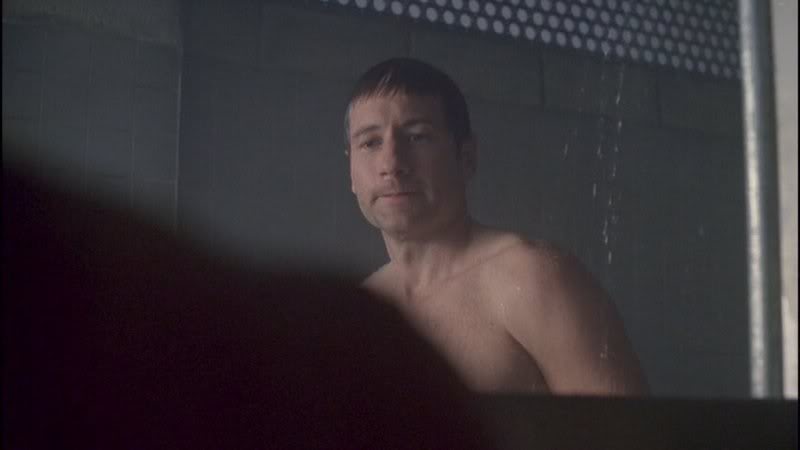
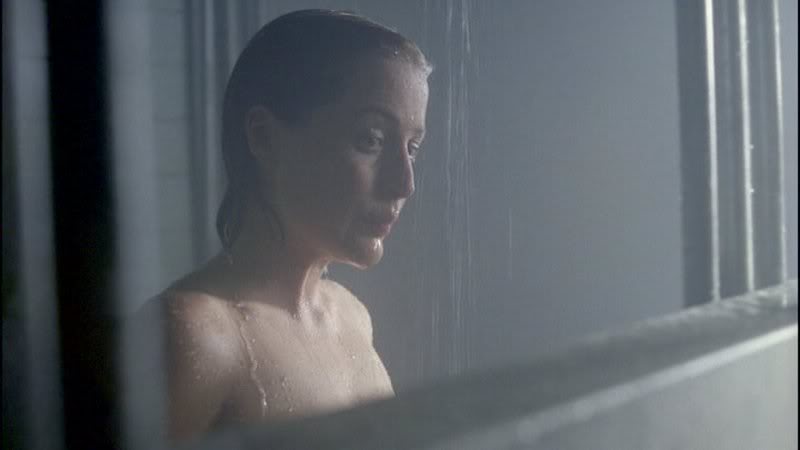
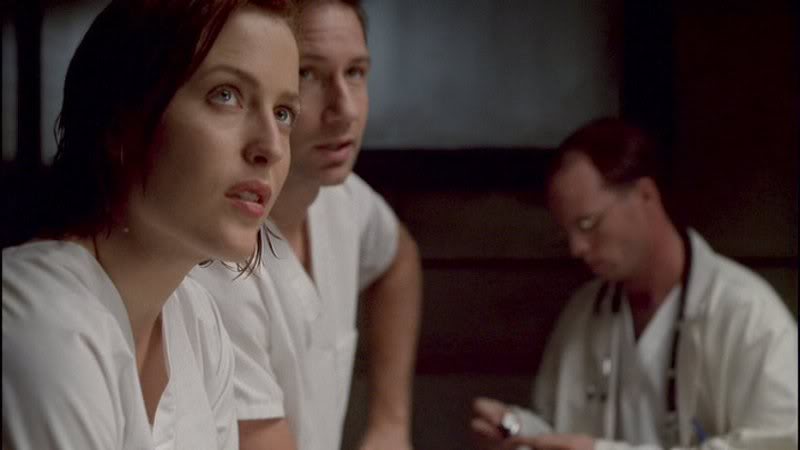
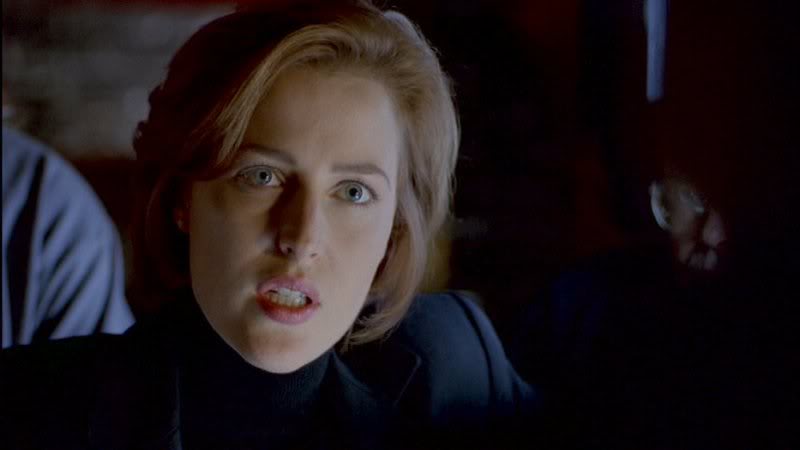
-- "The fact that Cassandra Spender was a successful alien-human hybrid spelled disaster for the human race," Spotnitz said, "so that was one of the important questions being answered in this episode -- what was the work of the conspiracy all those years. These episodes were few and far between and when they happened we had a lot to do."
-- To equip the operating theaters in the rail car and inside "Fort Marlene," set decorator Tim Stepeck made a pilgrimage to a local high-tech medical equipment firm -- and was pleasantly stunned when its owners and employers immediately stopped virtually their entire design and production activities to help their favorite TV series.
-- Spotnitz enjoyed bringing back Marita Covarribias, especially in her sorry state, "because I loved taking away the beauty of Laurie Holden."
-- On his DVD commentary, Spotnitz tried to "fill in the blanks," providing information that he felt had not been made clear during the series. "The idea was that the black oil was an ancient virus that had been around for millions and millions of years and was of extra terrestrial origin," Spotnitz explained. "It was here on earth and had been all over the galaxy, and it infected virtually every life form that there was in the galaxy, except for humans on earth and the faceless rebels. The rebels were trying to fight the virus. They were trying to avoid being contaminated to stop the complete conquest of the alien virus over all the other life forms in the galaxy. So they didn't want colonization to begin on earth. They were sort of the enemy of our enemy and so in a way, they were humanity's ally. That is why they played a pivotal role. Humanity had lost, Mulder had lost, and at the end of the episode the rebels in fact saved the day by stopping the delivery of Cassandra Spender to the aliens with whom the Syndicate had been conspiring."
-- "Cassandra and Jeffrey were interesting in this story because Cassandra was putting personal honor above everything, above her own life," Spotnitz said. "She knew what she was, she understood having been married to Cigarette-Smoking Man the role that she played and she knew that she had to die. If she doesn't die she knows it means the end of humanity. She was a woman of conscience, thought as a lunatic by the world at large, but really the only person who knew the truth and was willing to sacrifice her own best interests for humanity and the greater good. And her son who was a skeptic, a non-believer, who loved his mother, was not willing to admit the dilemma that she knew she was facing. She made the heroic choice."
-- The Season 6 DVD's feature two deleted scenes from "One Son." One was a scene of Cassandra being operated on, and Spotnitz said the scene was cut because it felt like the audience was being given too much too soon, bombarded with too much at one time. "Also, we weren't thrilled with the quality of the effects," Spotnitz said. "It wasn't up to the incredibly high X-Files standards, so it was easy to let it go."
-- The second deleted scene was a hallway discussion between Jeffrey Spender and Diana Fowley, and followed the scene between Jeffrey and his mother in her room at Fort Marlene. "The scene lacked conflict, it lacked dimension," said Spotnitz. "In the scene, Jeffrey told Diana and the audience what he was going to do -- that he realized Mulder was right about everything and that he was going to work with Mulder to bring down the man who did this to his mother, his own father. When we took the scene out, it affected nothing, except perhaps the audience saw more of Diana's duplicity, so the show was better without it."
-- "The scene with the Lone Gunmen was an interesting dynamic," said Spotnitz, "having Scully use the Lone Gunmen against Mulder -- one that we had never seen played out in quite that way and one that was an extension of the dynamic with Diana sort of out-Scullying Scully, forcing Scully to be more Mulderesque in her approach. Mulder did seem to have a kind of blind spot with regard to Diana Fowley; she was kind of his Achilles heel. Scully enlisted the Lone Gunmen, Mulder's old friends, in showing why Diana Fowley was not to be trusted, and she was making a very convincing case, but Mulder couldn't see it."
-- Spotnitz pointed out that the reference to MUFON in "One Son" was another of the many references to past episodes, specifically to "Nisei" when Scully found other abductees like herself -- members of the MUFON group -- who had the chips removed from their necks.
-- "This was an interesting thing that happened over the life of the series because in the beginning Scully was simply sent to spy on Mulder," Spotnitz explained. "And so it was really his quest and she was a character of conscience who forced him to do the right thing. But after her own abduction and the murder of her sister, this became just as much Scully's quest as it did Mulder's and you can really see it in the scene with the Lone Gunmen."
-- "The scene with the Gunmen is one of those scenes where you are reminded just how lucky we were to have David Duchovny and Gillian Anderson in these roles," Spotnitz said, "because not only were they such fine actors, but they really had this enormous chemistry that you see in that scene where you feel their love for each other even as they are fighting, even as they are having a split in the relationship and it just works without being scripted."
-- "We always loved to touch on conspiracy hot buttons," Spotnitz explained as the reason why Diana Fowley lived in the Watergate Apartments. Spotnitz added that as modern as the exterior of the Watergate Apartments is, the design of the interior of Diana's apartment was traditional because it was based on actual location photographs taken of apartments located at the complex.
-- Spotnitz said that having Mulder look through Diana's underwear drawer (and having Cigarette- Smoking Man comment on it) was another way to play with the rivalry between Scully and Diana; and having CSM show up in Diana's apartment was to increase the viewer's paranoia about her.
-- "It was another incredible gift that we happened upon William B. Davis," Spotnitz said. "He loved playing the scenes with Mulder and did them with seeming effortlessness. It wasn't easy to speak those kinds of words and make them seem natural. It was a very formal type of speech and he was the perfect guy for that job."
-- "The scene between Mulder and CSM was interesting because Mulder was very self-righteous and so sure that he was on the side of right," said Spotnitz. "But CSM made a very credible and compelling argument why they laid the American flag down at the feet of the aliens, why they sacrificed their personal honor for self-interest. And that argument was that the human race was going to lose, that the aliens were far superior to us, that they had much greater power, that they could have wiped us out. CSM explained that they made a devil's bargain which bought them time; don't destroy us now, give us time to work on this research project and create an alien human hybrid so that humanity could survive in the form of a slave race that would serve the aliens once colonization began."
-- "That seemed like a pretty terrible bargain to make," Sponitz continued, "but when you look at the alternative, the Syndicate and CSM had a pretty good case to make for what they did. And Mulder's father, the idealist like his son, was opposed to it but his position was completely impractical. So his father eventually came to go along with the Syndicate and reluctantly agreed to surrender his daughter Samantha, just as the rest of them agreed to surrender members of their family as security. They surrendered members of their own families in exchange for being given the alien fetus which we saw way back in Season One."
-- "When you try to explain it," Spotnitz observed, "very complicated!"
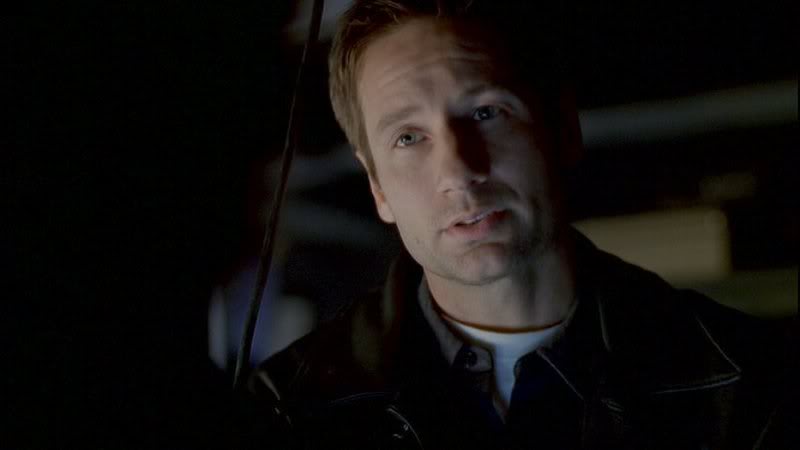
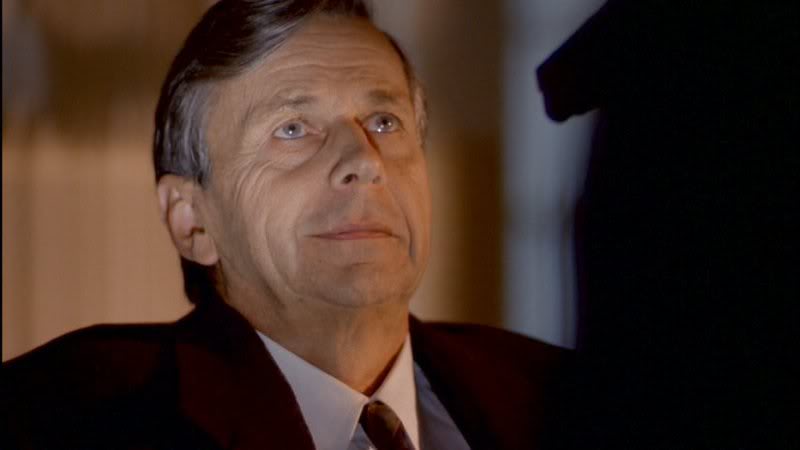
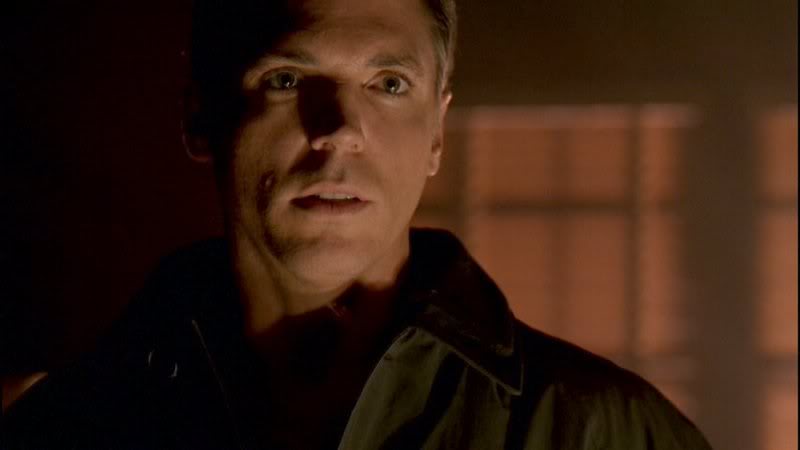
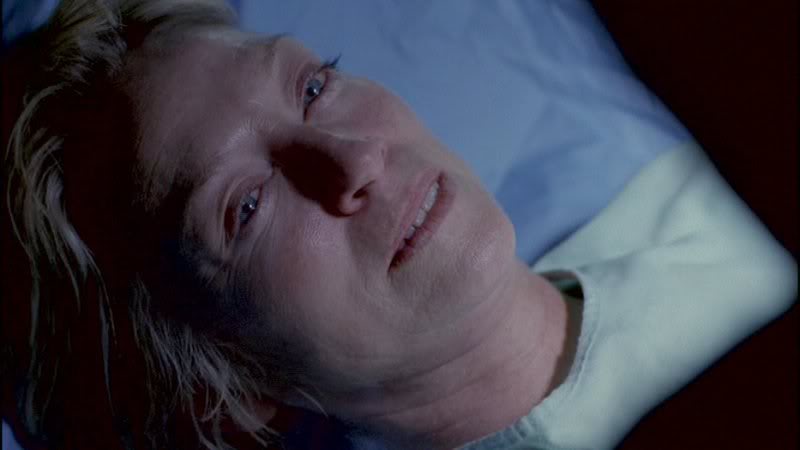
-- Spotnitz said that the historical reference the writers had in mind when developing this storyline was the Vichy government in France during World War II. Vichy France, or the Vichy regime, was the French government from July 1940 to August 1944, which succeeded the Third Republic. It was proclaimed by Marshal Philippe Pétain following the military defeat of France and the vote by the National Assembly on July 10, 1940, of extraordinary powers to Pétain, who held not the title of President of France but rather President of the Council. The "French state" willfully collaborated with Nazi Germany to a high degree, including raids to capture Jews and other "undesirables."
-- "We kept thinking that the Syndicate was in the same position as the Vichy government -- Marshal Pétain and the French officials who were given the choice of fighting the Nazi's, be destroyed by the Nazi's, or to collaborate with the Nazi's," Spotnitz said. "The Syndicate made the same decision -- to collaborate with the aliens rather than be destroyed by them."
-- In his DVD commentary, Spotnitz praised the work of set designer Corey Kaplan, cinematographer Bill Roe, and director Rob Bowman. "You really see Rob's touch in an episode like this," said Spotnitz. "It is unmistakable. The compositions, the elegant camera moves, and the blacks. Rob Bowman loves blacks and I think he pushed the blacks further than any director. It had its effect on the whole aesthetic of the show."
-- "The heroic aspect to the Syndicate's bargain was that it bought time to work on a vaccine against the virus, an idea Mulder's father came up with," Spotnitz explained. "That references any number of past episodes, but probably most specifically 'Tunguska' and 'Terma' where we established that there was sort of an arms race, or a vaccine race, going on, where the Russians were working on a vaccine and so were we."
-- "I think one of the most surprising turns in this episode was Mulder seeming to go along with the bad guys," said Spotnitz. "CSM told Mulder that his father sacrificed so that Mulder could live, so that he could live, so that everyone in that cabal would get to survive; and he gave Mulder the little piece of paper saying 'Take this, cause it's your ticket to ride, your ticket to survive.' And Mulder took it. That was a very surprising thing for the hero of your TV series to do; and it was really only Scully who brought him back to his senses, who pulled him away from Diana Fowley."
-- "Bill Mulder and Cigarette Smoking Man were obviously the 'Two Fathers,'" Spotnitz explained about the titles for the two-part episodes. "And our idea was that you had three young men who were all vying to be the 'One Son.' Jeffrey Spender was the biological son of Cigarette-Smoking Man and Cassandra Spender. Krycek was not biologically anybody's son, but he aspired to be the CSM's protégé. He was son-like to him and wanted to be the heir. And then there was Mulder. It was always unclear whether Mulder was biologically the son of Bill Mulder or the son of Cigarette-Smoking Man, since we had revealed that CSM had an affair with Mulder's mother. So Mulder could be the illegitimate son of CSM. Krycek was rebuked by CSM who didn't consider him a worthy successor, Spender was turning away from CSM, and that left Mulder. He was the 'one son' left standing at the end of this two-parter."
-- "I liked the scene between Cassandra and CSM on the train," said Spotnitz. "It was surprising because we knew CSM to be this really evil and venal and self-interested man who had done everything terrible, but yet that scene showed that he still loved Cassandra and was hoping for reconciliation even after all he had done. Even when she was begging him to destroy her, he couldn't. I suppose you could argue that he wouldn't do it because that would be violating the terms of the agreement with the aliens and he himself might be destroyed if he destroyed her, but I think from Bill's performance you also get that he loves her still and can't bear the thought of destroying her."
-- "Veronica Cartwright also did a great job in that scene," Spotnitz said. "She's such a fine actress and she really got into this. It was very difficult material and she made it all seem very believable. Watching the episode again after so many years, I was struck by how wild and far out and sci-fi it all sounded. So I think you can understand why we parsed it out so slowly and why we put it in the language we put it in. Because it does sound believable when said in plain language."
-- "There is so much dramatic crowding in one of these mythology episodes," Spotnitz recalled. "You have so much to do. The episode is just chocked with business to accomplish. And in an episode like this, with huge things going on, you realize the compromises you have to make to do it on television, on a television production schedule and with television money. Because of the limitations, the whole idea of colonization is basically played out through the dialogue of these characters."
-- "In the scene between Diana and Mulder, David played it exactly as we wanted," Spotnitz said. "His posture, his performance, his dialogue was designed to make the viewer wonder 'what is Mulder going to do? Is he going to expose her for the evil bad guy she is? No, he's going to show her the ticket to ride and invite her to join him and kiss her.' Viewers probably wanted to believe that it was all an act, a ploy on Mulder's part that he really wasn't going to go along with all of this. But there was no evidence of that on screen. It was pretty clear that Mulder was intending to give up and survive. This was Mulder going to the dark side."
-- "I think if anyone had a doubt whether Diana Fowley was a bad guy, the kiss moment told you she was a bad guy," Spotnitz chuckled. "Instead of appealing to Mulder's conscience or struggling with the decision in any way, she was flattered by the invitation and kissed him."
-- The time stamp when Spender was looking for his mother was 10:13 (Chris Carter's birth date).
-- Actress Jo Black-David, who played the murderous nurse in "One Son," was casting director Rick Millikan's high school drama teacher.
-- For the scenes in which supposed Syndicate members were revealed to be alien rebels, John Vulich applied two complete masks -- one on top of the other, separated by a layer of gelatin -- to each appropriate actor.
-- "When Scully called Mulder, she was in her 'Mulderesque' role again," Spotnitz said, "driving Mulder to action, urging him toward his one last chance to be heroic, his one last chance to stop everything by stopping the train car."
-- Production designer Corey Kaplan supervised the transformation of the train car in "One Son" to appear identical to the cars first established in "Nisei/731." "It was fun for us to revisit that notion with the same set," recalled Spotnitz, "but time and money limited how much we could do with the trains in Los Angeles."
-- The open air rail yard where the scenes for both "Two Fathers" and "One Son" were filmed was located in Wilmington, a stark industrial district -- especially ominous after dark -- near Los Angeles Harbor. Its sidings were filled for the occasion with railroad cars completely re-sided and repainted.
-- Although the train carrying the Cigarette-Smoking Man and Cassandra Spender appeared to be traveling at high speed, in reality it never got above eight miles per hour -- the speed limit in the rail yard used for filming. The illusion was created with sound effects, music, clever camera angles, and quick cutting.
-- The unfortunate sedan hastily abandoned by Mulder and Scully, then crunched by the onrushing locomotive, was a water-damaged Ford LTD donated by the car company and prepared by transportation department mechanic Kelly Padovic -- who removed the engine and drivetrain -- for crunching.
-- The bullets that Mulder and Scully fired ineffectually at the engineer's cab were computer-generated by Bill Millar and his helpers.
-- The time everyone met at El Rico Air Force Base was 11:21; 11/21 is Chris Carter's wife's birthday.
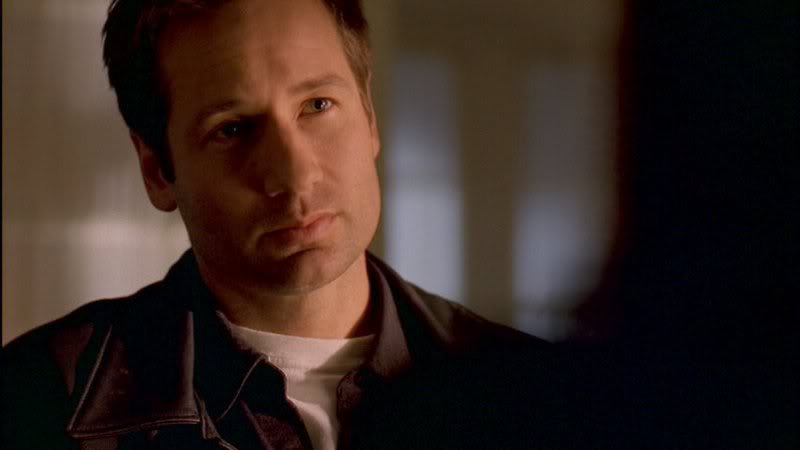
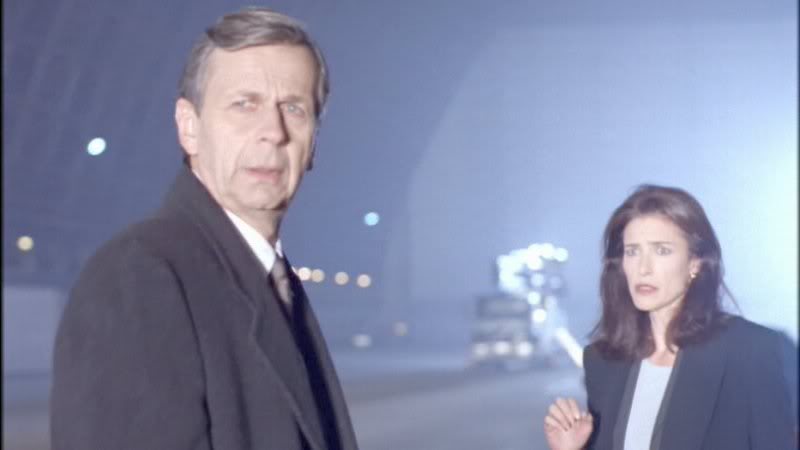
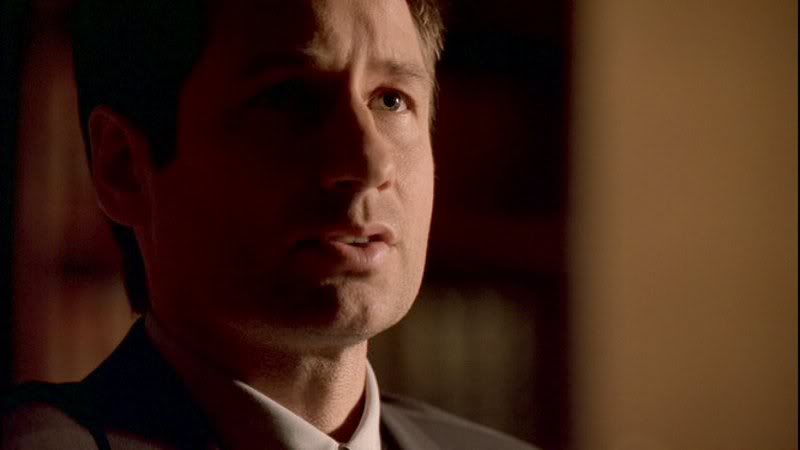
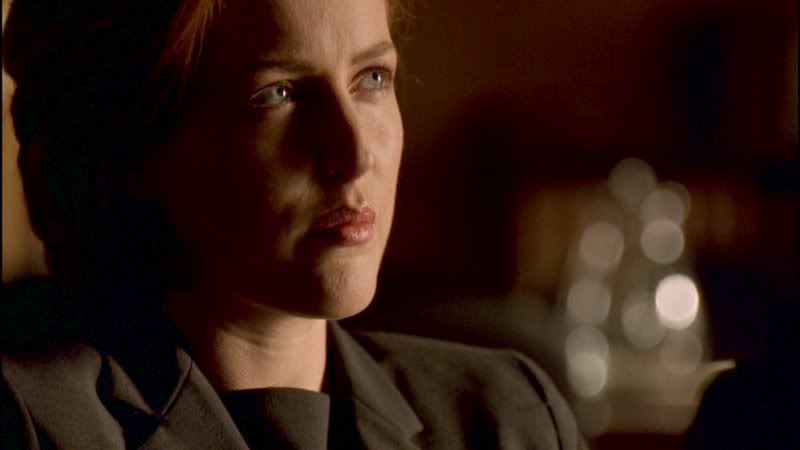
-- "Krycek, ever the entrepreneur, was pursuing his own agenda, as usual," Spotnitz said, "thinking he was going to take the alien fetus for himself because it would be worth something, but he discovered that the faceless rebels beat him to the punch."
-- "Krycek was a great, great villain but somehow you liked him," Spotnitz said. "He was just despicable but you always liked him. It is just a quality that certain actors carry with them, and Nic Lea had that. Of course, Krycek had nothing but contempt for Spender. He considered him weak and naive, didn't really consider him a player. And when Krycek saw that Spender was trying to save his former lover Marita, he didn't lift a finger to help her because that's the kind of guy Krycek was."
-- As he watched the episode for his commentary, Spotnitz admitted, "It strikes me that if you were to tune into this episode without watching the show with some frequency over the years, it would be utterly incomprehensible. It's very tense even if you do follow the show. It's very baroque, very self-referential, and it requires some intimacy with these characters and the politics of these characters to even care about what is going on. What was about to happen, the destruction of the Syndicate, was a pretty huge event in the life of the series, but the casual viewer wouldn't really get it."
-- "One way to read the scene where Diana arrived at El Rico was that she knew to come there thanks to Mulder," Spotnitz said. "But the other way to read it is that she already knew to come there thanks to CSM, and I think the way the scene plays confirms that."
-- The visual effect of the "doctor" morphing into the faceless rebel was one special effect that Spotnitz was never happy with. "It was one of those cases where we just ran out of time, I'm sorry to say," he said. "The production value in the rest of the scene was just fantastic, but then we had that CGI shot that I was not fond of. I would love a chance to go back and fix that one of these days."
-- Spotnitz recalled that he was very sorry to kill off Syndicate Elder No. 1, played by Don S. Williams. "I loved the actor," he said.
-- "Iconic images," said Spotnitz about the final shot of the faceless rebels preparing to exterminate the Syndicate and members of their families. "That is what you got with directors like Rob Bowman and Kim Manners; they understood the power of great images in a series like this. People talked about The X-Files being like little movies because of images like those in this episode -- you just don't normally see those on television."
-- "We originally wanted to play on that scene and see the incineration of the Syndicate," Spotnitz explained. "But that airplane hanger was one of the largest wooden structures in the world so fire was not an option."
-- "Having Spender admit that Mulder was right was the last thing that Kersh wanted," said Spotnitz. "But if you put yourself back in the reality of having watched the show weekly, it was a great sense of gratification to have that moment finally arrive. It was a long time coming."
-- "If you really were to track Scully through the mythology episodes, her character did change enormously," Spotnitz observed. "It is true that in the stand-alone episodes, which were the bread and butter episodes of the series, she remained the skeptic or rather the character who tried to explain everything through science consistently through the first seven seasons of the series. But in the mythology episodes she underwent radical transformations and I think that was very clear in a scene like the end scene in Kersh's office where she was just as much a crusader as Mulder. And you could argue more so because she brought Mulder to his senses when he was ready to give in."
-- Spotnitz noted that the music from The X-Files feature film was used intentionally in the episode. "The orchestration was never heard in previous seasons," he said, "but it made connections from the feature film to this two-parter, which was appropriate since the film started to answer questions and was really the beginning of the closing chapters of this part of the mythology."
-- "I think the end scene, Spender shooting his son, was a hell of a shocker," Spotnitz said. "There are few crimes worse than what CSM did. The scene was nice both for the inevitability of it, the cost that Jeffrey Spender paid for doing the right thing, and for reminding people of just what an evil guy the CSM was. We needed to keep giving him really terrible things to do to feel the sting of a character like that."
-- Chris Owens (Jeffrey Spender) recalled that his phone rang days before shooting began on the two-parter. "Just before I got the script I got a message to call Chris Carter's Office," Owens said. "He was very calm. He said, 'I've got something to tell you about the episode.' And I said, 'Are you going to fire me?' And he said, 'No, but I am going to shoot you.' He said to trust him, it was going to be a very noble death. I said, 'I do trust you, implicitly.' And Carter said, 'Trust no one.'"
-- Dean Haglund (Langly) explained that Owens told him "the script for 'One Son' arrived with a couple of pages missing. And those pages were what happened to Agent Spender. So Chris Owens called Chris Carter and they were talking on the phone and Carter told him, 'Listen, I don't want you to be upset, but you get shot in this episode, but they don't find a body, so you may come back.' Because that's the beauty of The X-Files. Nobody really dies on The X-Files. Yes, you see them shot and writing their names in blood, but it doesn't mean they're dead, per se. So Chris [Owens] hangs up the phone, and silently, under the door, slipped the actual scene where he got shot. It's just quietly slipped under his door, like the courier was just listening at the door for Chris [Carter] to tell him before he actually gave him the information. And then Chris [Owens] just looked at it and thought, 'Oh my God, I'm in an X-Files episode! How creepy is this?'"
-- Owens recalled fondly how William B. Davis (CSM) became upset when it came time to film Spender's final scene. "Bill said, 'I don't want to shoot you! I enjoy working with you,'" said Owens. "Of course, he didn't have any trouble slapping me."
-- More than any other episode in the sixth season, "Two Fathers/One Son" made extreme demands on department makeup head Cheri Montesanto-Medcalf and her crew. In addition to "de-aging" the numerous flashbacked Syndicate members with strategically applied highlights and shading, wrinkle-erasing bits of adhesive tape, even a prosthetic device or two, she also had to "burn" Dr. Openshaw in "Two Fathers" and "freeze" the Head Surgeon in "One Son."
-- Said Montesanto-Medcalf, "For the burns we used a combination of gelatin, coloring, and latex 'tissue.' I remember thinking as I did it: 'Is this too much?' Because it looked gross. I'd never gone so far on any other TV show. But they loved it. They got in so close to it when they framed the shots. I'm really proud of that."
-- To create the frozen Head Surgeon, Montesanto-Medcalf initially gave the actor's face a blue makeup tinge, then carefully glued on "icicles" carved out of blocks of silicon. "The funny thing about that one," she recalled, "was that when we were doing it the guy kept leaving my chair to 'blow his nose' or 'get a Tylenol.' But I knew he was actually going out to smoke. I could smell the cigarettes on him. So one time, after he'd been gone a long while, I told him: 'Oh, by the way, don't smoke with that stuff on your face. It's flammable.'"
-- The Head Surgeon was played by actor Robert Lipton who was the brother of Peggy Lipton (Mod Squad).
-- Montesanto-Medcalf and her makeup team won the Emmy Award for Outstanding Makeup for a series for their work on "Two Fathers/One Son."
-- Chris Carter said that after "Two Fathers/One Son," the series would "deal with the men and women left standing. How are these people going to survive [an alien invasion] and to what lengths will they go to do that? You can look at the show as pre-'Two Fathers/One Son' and post-'Two Fathers/One Son.' A new conspiracy really developed after these episodes and while it became its own independent conspiracy, actually we saw that there was a connection between the two."
-- "The analogy I made in my own mind," said Spotnitz, "was that these episodes were like the fall of the Soviet Union. Players and pieces were still there, but what happened would change the dynamics of everything."
-- "There was an awful lot we wanted to accomplish -- a lot of questions we wanted to answer -- at the same time we were creating two entertaining episodes," said Spotnitz. "The truth is, unfortunately, that there were so many questions raised in the course of the series that not all of them could be answered to everyone's satisfaction. But with 'Two Fathers/One Son,' by and large, I think we delivered what we promised."
-- Once & Future Retreads: The episode featured many series semi-regulars as well as many actors who had appeared numerous times as members of the Syndicate.
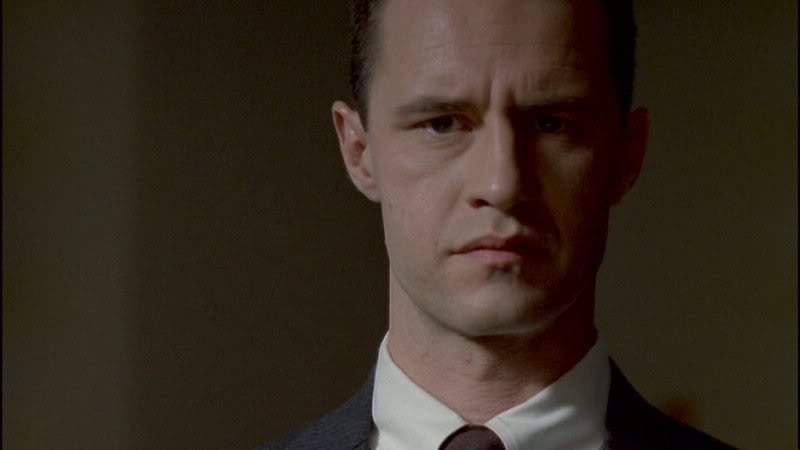
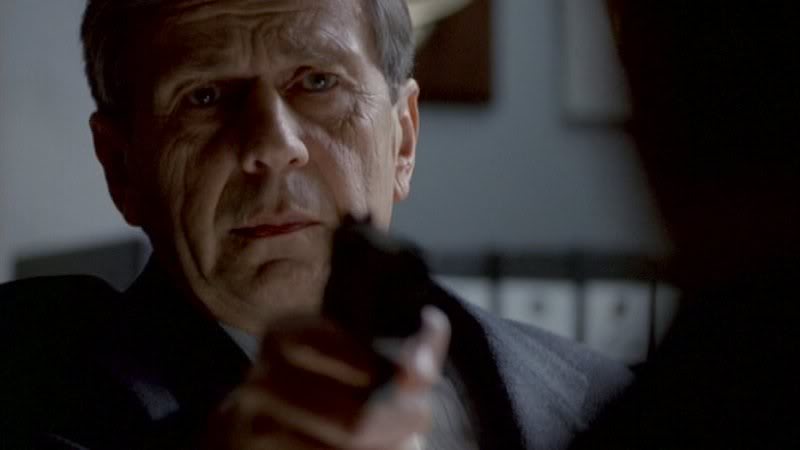
(Thanks to chrisnu for today's episode pics.)
Please share your first impressions, favorite (or cringe-worthy) moments, classic lines, favorite fanfic, nagging questions, repeated viewing observations, etc., as today we celebrate "One Son"!
Polly